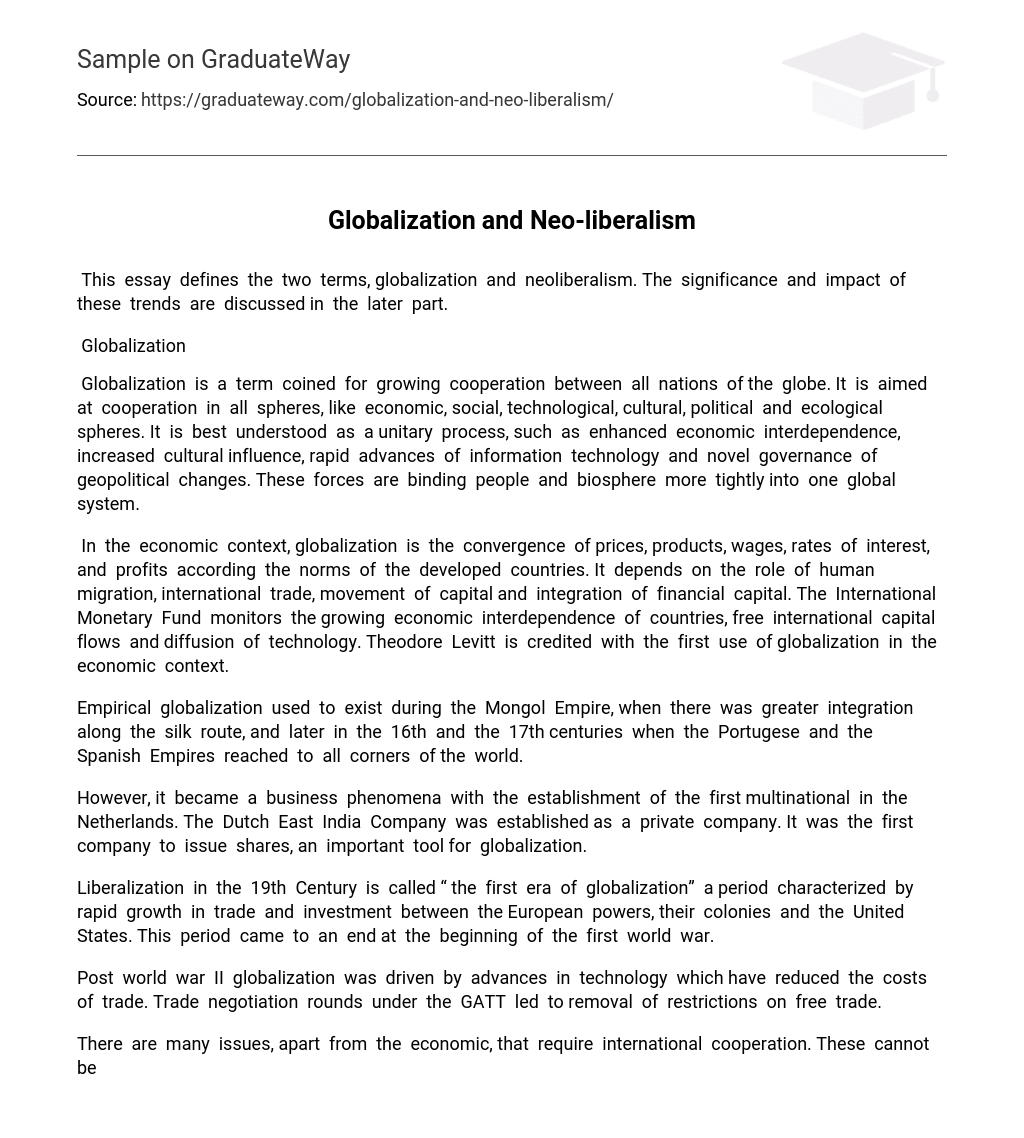This essay defines the two terms, globalization and neoliberalism. The significance and impact of these trends are discussed in the later part.
Globalization
Globalization is a term coined for growing cooperation between all nations of the globe. It is aimed at cooperation in all spheres, like economic, social, technological, cultural, political and ecological spheres. It is best understood as a unitary process, such as enhanced economic interdependence, increased cultural influence, rapid advances of information technology and novel governance of geopolitical changes. These forces are binding people and biosphere more tightly into one global system.
In the economic context, globalization is the convergence of prices, products, wages, rates of interest, and profits according the norms of the developed countries. It depends on the role of human migration, international trade, movement of capital and integration of financial capital. The International Monetary Fund monitors the growing economic interdependence of countries, free international capital flows and diffusion of technology. Theodore Levitt is credited with the first use of globalization in the economic context.
Empirical globalization used to exist during the Mongol Empire, when there was greater integration along the silk route, and later in the 16th and the 17th centuries when the Portugese and the Spanish Empires reached to all corners of the world.
However, it became a business phenomena with the establishment of the first multinational in the Netherlands. The Dutch East India Company was established as a private company. It was the first company to issue shares, an important tool for globalization.
Liberalization in the 19th Century is called “ the first era of globalization” a period characterized by rapid growth in trade and investment between the European powers, their colonies and the United States. This period came to an end at the beginning of the first world war.
Post world war II globalization was driven by advances in technology which have reduced the costs of trade. Trade negotiation rounds under the GATT led to removal of restrictions on free trade.
There are many issues, apart from the economic, that require international cooperation. These cannot be solved by any country on its own. Issues like cross boundary air and water pollution, degradation of natural environment, regulation of outer space, global warming etc. require close links between many nations. New global institutions are a necessity to solve these types of problems. Since the end of WW II there has been an explosion in reach and power of multinational corporations and global civil society.
The major aspects of neoliberalism as summarized from “ A definition of Activities”, by Elizabeth Martinez and Arnoldo Garcia, from the corporate watch, include:
The rule of market freedom for capital, goods, and services and deunionizing of labor forces and removal of all regulations.
- Reducing public expenditure for social services.
- Deregulation to allow market forces to self regulate.
- Privatization of public enterprises
Changing perceptions of public enterprise and community to individualis and individual responsibility. The guiding principles for neoliberalism, as perceived by Richard Robbins i his book, “ Global problems and culture of capitalism”, (Allyn & Bacon 1999, p.100) are Sustained economic growth is the way to human progres Free markets without government interference will be most efficien Economic globalization would be beneficial to everyone.
Privatization removes inefficiencies of public sector. Government should mainly function to provide infrastructur The roots of neoliberalism lie in a book titled, “ The wealth of Nations”, b Adam Smith in 1776. Today, Adam Smith is regarded as the father of modern free market capitalism. In this book he had suggested that for maximum efficiency all government intervention in economic issues must be removed.
Trade between countries till the great depression of 1930s was largely supported by geopolitical factors, mainly colonization. The resources of the colonized countries were brutally exploited by the colonizers to maximize their profits. No element of free trade as perceived by Adam Smith was present in these practices. The climax of savagery was trade of African humans as a commodity !!
In the years that followed, elites and corporations saw their profits diminish, under the equalizing effect. Post world war II, economist Freidrich von Hayek, at the University of Chicago, propagated the theory of neoliberalism, which was nothing but revival of economic liberalism stated by Adam Smith.
The Thatcher and Reagan era, in particular, saw neoliberalism pushed to every part of the globe, almost demonizing anything that was public, and privatizing anything that was owned by the public, using military interventions if needed. The poorer countries were forced to open their economies so that big businesses from the rich countries could own or access resources cheaply. The poor nations have always been the target. ( Shah Anup )
Globalization and neoliberalism
The world affairs have been, are and will be in future, dominated by the big five to seven brothers who term themselves as ‘ developed countries’. All the other ‘developing’ , and ‘poor’, countries are like puppets who must dance according to the tunes of these big brothers. If they do not they will be squeezed by military actions and economic sanctions. History proves this.
Globalization and neoliberalism are new words coined to replace ‘colonization’ and ‘slavery’. It is the same body, wearing a new suit, that is adorned with decorative buttons like, “ international cooperation”, and “mutual progress”. It is a hoax, created once again by the developed nations, to exploit the poor and the developing countries.





